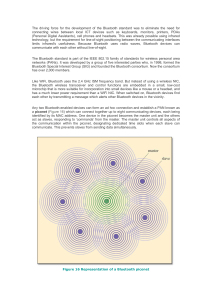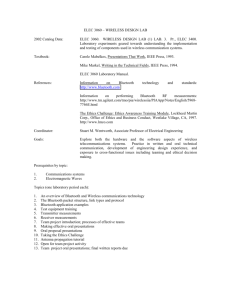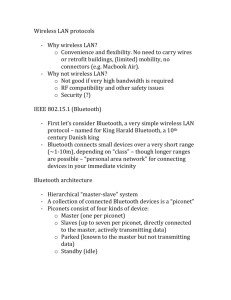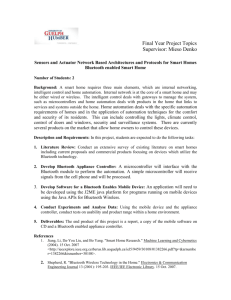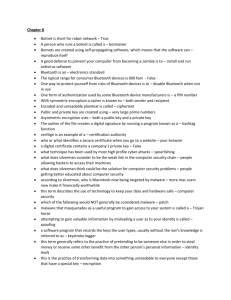Skr4800_Bluetooth Technology
advertisement
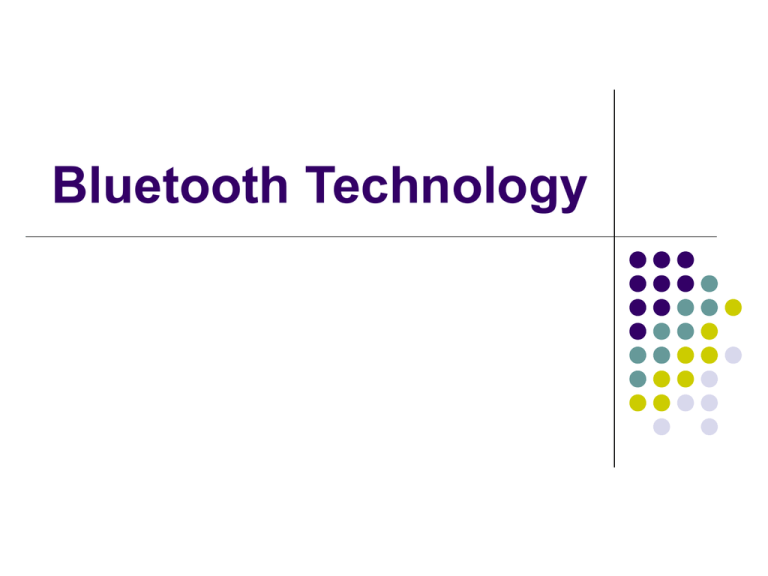
Bluetooth Technology What is Bluetooth? Bluetooth is a short- range communications technology that allows devices to communicate with each other without cables or wires while maintaining high levels of security Bluetooth tech has achieved global acceptance The strength of Bluetooth is the ability to simultaneously handle both data and voice transmissions. Ex: (hands free headset, synchronizing PDA) How Bluetooth works? A Bluetooth connection is wireless and automatic. Keep transmission power extremely low to save battery power. And each transmission signal to and from your cell phone consumes just 1 milliwatt of power. The big draws of Bluetooth are that it is wireless, inexpensive and automatic. Bluetooth doesn't require high bandwidth. Bluetooth is essentially a networking standard that works at two levels: It provides agreement at the physical level - Bluetooth is a radiofrequency standard. It provides agreement at the protocol/transport level, where products have to agree on when bits are sent, how many will be sent at a time, and how the parties in a conversation can be sure that the message received is the same as the message sent. Physical Channel Physical is the lowest architectural layer in Bluetooth wireless technology. All Bluetooth physical channels are characterized by an RF frequency combined with temporal parameters and restricted by spatial considerations. The Bluetooth enabled devices use a shared physical channel for communication. To achieve this, their transceiver needs to turn on to the same RF frequency at the same time, and have to be at the nominal range of each other. For Bluetooth, physical layers are defined. Each optimized and used for a different purpose. They are: -The basic piconet channel -Adapted piconet channel -Inquiry scan channel -The page scan channel Piconet Devices connect and communicate wirelessly through short range, ad-hoc network 1 device provides the synchronization reference and known as the master. Other devices known as slave. A group of devices synchronized in this fashion form a piconet. A device may participate in two or more piconet by using time division multiplexing Located at physical channel and divided into two: Basic piconet channel Adapted piconet channel Security Key authentication and encryption. Many Bluetooth devices rely on 128bit numeric PIN numbers. When Bluetooth products identify themselves, they use the PIN code first time they connect. Bluesnarfing: refers to attackers using a Bluetooth connection to steal information from Bluetooth device Security (cont’d) Bluejacking Allows phone users to send business cards anonymously using Bluetooth wireless technology. Bluejacking does NOT involve the removal or alteration of any data from the device. These business cards often have a clever or flirtatious message rather than the typical name and phone number. Phone owners who receive bluejack messages should refuse to add the contacts to their address book. Bluebugging Allows skilled individuals to access the mobile phone commands using Bluetooth wireless technology without notifying or alerting the phone’s user. This vulnerability allows the hacker to initiate phone calls, send and receive text messages, read and write phonebook contacts, eavesdrop on phone conversations, and connect to the Internet. Bluetooth Mobile phone headset Typical Bluetooth USB adapter PCMCIA Bluetooth adapter Typical Bluetooth antenna


